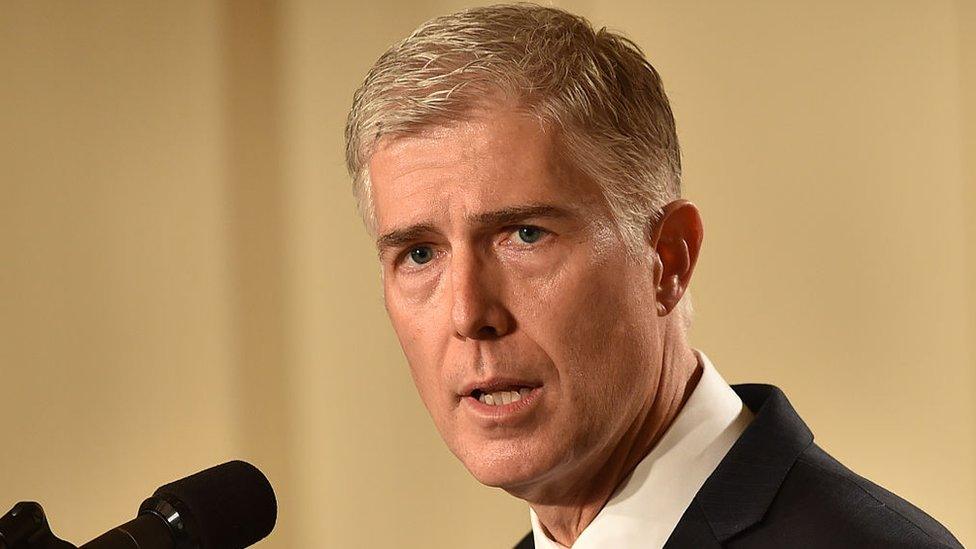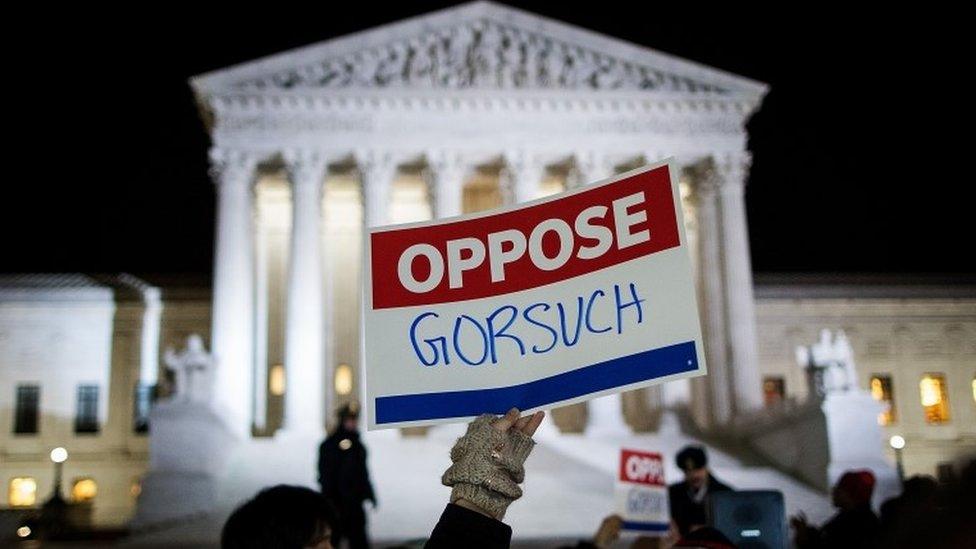Democrats in dilemma over Supreme Court
- Published

In a season of Democratic Party frustration and anger, Donald Trump's nomination of Neil Gorsuch to the US Supreme Court Tuesday night is a particularly bitter pill to swallow.
When the seat opened nearly a year ago following the death of Justice Antonin Scalia, Democrats imagined a durable liberal majority on the court for the first time since the 1960s.
Even as the Republican Senate majority broke with longstanding tradition and blocked any consideration of President Barack Obama's nominee, Merrick Garland, Democrats comforted themselves with the prospect of Hillary Clinton's likely victory in November's presidential election. They entertained the possibility that she would instead pick someone younger and even more progressive than the decidedly moderate Mr Garland.
Then the election happened - setting up the inevitability of Tuesday night's prime-time announcement. President Trump, standing in the East Room of the White House, sprayed lemon on their open wounds, noting that the next Supreme Court justice would follow in Scalia's conservative footsteps.
Republicans, across the board, are thrilled with the pick. Mr Gorsuch has a sterling legal reputation and indisputable right-wing pedigree. While Mr Trump has proven an uncertain quantity when it comes to fealty to other party orthodoxies, they view his court pick as their trust rewarded.
Donald Trump picks Neil Gorsuch as US Supreme Court nominee
"President Trump won 81% of the evangelical vote in no small measure because he made an ironclad pledge that if elected he would fill the vacancy on the US Supreme Court with a strict constructionist who would respect the Constitution and the rule of law, not legislate from the bench," Faith and Freedom Coalition Chair Ralph Reed said in a press release. "We never doubted then-candidate Trump's sincerity or commitment, and by nominating Judge Gorsuch, he has now kept that promise."
As great as was conservative joy, so were the depths of liberal anger - likely only stoked by calls by Republicans, from Mr Trump on down, to give their nominee a fair shake.
"The default is if you are generally qualified and not extreme you are confirmed," White House press spokesman Sean Spicer said on Tuesday afternoon.
It's a sentiment that has not been welcomed by those on the left.
"The Democrats should treat Trump's [Supreme Court] pick with the exact same courtesy the GOP showed Merrick Garland," tweeted, external Dan Pfeifer, a former senior adviser to President Barack Obama. "Don't flinch, don't back down."
Senate Democrats considering Mr Gorsuch's nomination have a powerful weapon at their disposal, should they choose to use it - the filibuster. If 41 of the 48 members of their caucus are on board, they could block a confirmation vote indefinitely. It's something some Democrats are already promising to do.
"This is a stolen seat," Democratic Senator Jeff Merkley of Oregon said, pledging to invoke the filibuster power. "We will use every lever in our power to stop this."
Such a scorched-earth strategy puts Senate Democrats in a bit of a bind, however.
Labor union leader Mary Kay Henry: "This judge is a step backwards"
First of all, if they do indeed filibuster, Republicans may simply do away with the procedure entirely - the so-called "nuclear option" - as Democrats did for all other presidential nominees in 2013, allowing Mr Gorsuch to be confirmed with a simple majority.
"If you can, Mitch, go nuclear," Mr Trump urged Senate Majority Leader Mitch McConnell in a meeting on Wednesday.
In fact, Democratic pressure could prompt Republicans to do away with the Senate tradition entirely, allowing their party to enact all legislation without minority consent. That would make it significantly easier for Congress to pass conservative priorities like Obamacare replacement, weakening union power, education reform and sweeping deregulation.
Already some Democrats are giving indications they may not take such a hard-line stand.
"I'm not going to do to President Trump's nominee what the Republicans in the Senate did to President Obama's," Delaware Senator Chris Coons said in a television interview.
Mr Coons is in a safely Democratic seat. The 10 Senate Democrats up for 2018 re-election in states Mr Trump carried last year may be under even more pressure to avoid total war with the president over a Supreme Court nomination.
While the base may be angry, they will need independent and moderate conservative votes if they want to stay in office.
Ronald Klain, a former legal adviser to Democratic President Bill Clinton, offers another reason why Democrats should be cautious when choosing how to handle Mr Gorsuch's nomination. The real battle is not over this seat - it's the next one.
While it seems unlikely any of the four liberal justices will willingly vacate their seats during the Trump administration, 80-year-old Anthony Kennedy - who leans conservative but has proven to be a swing vote - may be gauging retirement and will be watching the proceedings closely.
"While it is tempting to begin the confirmation process with an intent to avenge the injustice done to President Barack Obama and his nominee," Klain writes, external, "an attitude of score-settling and partisan bitterness would likely be off-putting to Kennedy."
The Democratic base may not care. They're angry, and they're out for blood - and if they don't get it from Republicans, they may turn on their own.
"Senate Democrats, let's be very clear: You will filibuster and block this Supreme Court nominee or we will find a true progressive and primary you in next election," liberal filmmaker Michael Moore tweeted, external.
More than 1,000 Democrats showed up at a town hall by Rhode Island Senator Sheldon Whitehouse after he voted to support Mr Trump's CIA nominee. Around 200 protesters picketed California Senator Dianne Feinstein's California home in response to her votes for several of his cabinet picks.
Democrats ignore this sentiment at their own peril - and their recent efforts to delay confirmation of Mr Trump's cabinet appointments may be evidence that they are getting the message. The situation is similar to the one the Republican Party found itself in following Barack Obama's election.
At first, they thought they could harness conservative Tea Party anger to defeat Democrats. They did - but the Tea Party brought down a lot of establishment Republicans, as well.
This damaged the party's electoral chances in the short term, likely costing them the Senate in 2010 and 2014. It also contributed to Mr Trump's rise and eventual victory in 2016, however.
That, alone, should be enough to give Democrats officeholders many a sleepless night.
- Published1 February 2017

- Published1 February 2017
